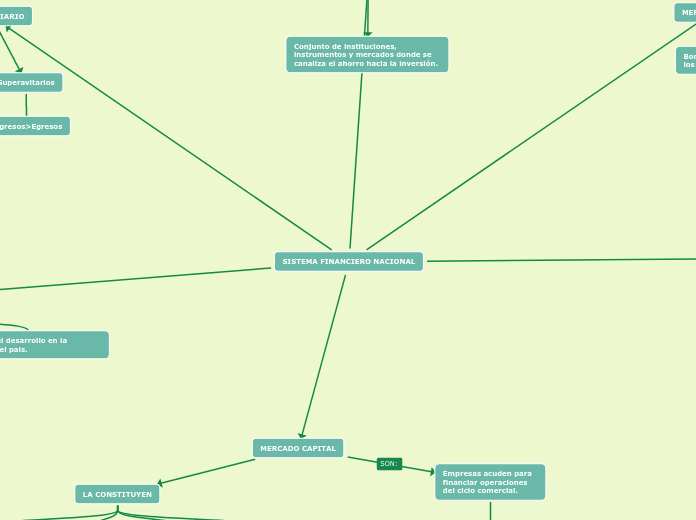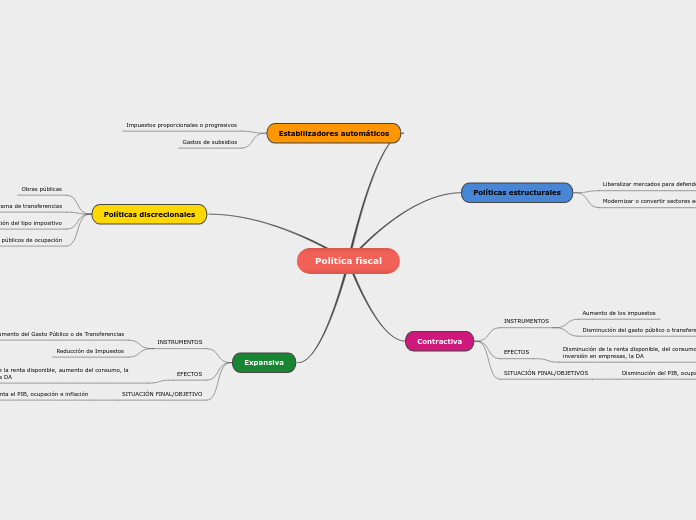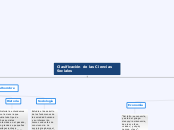SISTEMA FINANCIERO NACIONAL
Type in the name of the multiple-perspectives text.
Example: Bridge to Terabithia by Katherine Paterson
CLASIFICACION DE MERCADOS FINANCIEROS
MERCADOS DE RENTA VARIABLE
Acciones, garantías y participaciones de una empresa.
MERCADOS DE RENTA FIJA
Bonos u obligaciones y los papeles comerciales.
MERCADO MONETARIO
El Estado
Entidades Financieras
Los especuladores de la Bolsa de Valores
El Publico
Point of view
Type in a relevant quote that highlights the character's point of view. Try to follow a citation format: author's name, chapter, and page.
Example: I can't get the poetry of the trees,' he said. She nodded. Don't worry,' she said. You will someday. He believed her.' (Paterson, 4. 24)
Compra y venta de activos a corto plazo.
*Cheques
*Préstamo Corto plazo
*Tarjeta de Credito
What does the character think, say or do that suggests their perspective on the issue?
Type in a quote and try to maintain the citation format.
Example: 'He would like to show his drawings to his dad, but he didn't dare. (...) He'd thought his dad would be pleased. He wasn't. What are they teaching in that damn school? he had asked.' (Paterson, 2.8)
¿QUE ES?
Conjunto de instituciones, instrumentos y mercados donde se canaliza el ahorro hacia la inversión.
MERCADO CAPITAL
LA CONSTITUYEN
Sector externo
Los ahorristas
El ente emisor BCRP
Los bancos comerciales
Empresas acuden para financiar operaciones del ciclo comercial.
*Empresas
*Tiendas
*Bancos
Type in a relevant quote that highlights the character's point of view towards
MERCADO CAPITAL.
Try following a citation format: author's name, chapter, and page.
Example: 'Jesse drew the way some people drank whiskey. (...) Lord, he loved to draw. (...) When he was in first grade, he told his father that he wanted to be an artist when he grew up.' (Paterson, 2. 7)
BENEFICIOS
Promueve el desarrollo en la economía del pais.
Decide on the fourth point of view
Type in the name of the last character whose perspective on the issue you are going to present.
Example: Leslie Burke, Jesse's new next-door neighbor, and best friend.
Genera fuentes de trabajo.
Whose character does the third point of view belong to?
Type in his/her name.
Example: Mr. Aarons, Jesse's father.
Relaciona a Superavitarios y Deficitarios.
INTERMEDIARIO
Identify an important issue from the text that is being presented from different angles. Type it in.
Example: Jesse's drawing talent.
Superavitarios
Decide on the second point of view
Name the character (it can either be the main character or one of the supporting characters) whose point of view you are presenting.
Example: Miss Edmunds, Jesse's music teacher.
Ingresos>Egresos
Type in a quote that points out the character's position about the issue.
Try to follow a citation format: author's name, chapter, and page.
Example: 'She said he was unusually talented, and she hoped he wouldn't let anything discourage him.' (Paterson, 2. 8)
Deficitarios
Decide on the first point of view you are going to present.
Type in the name of the character (it can either be the main character or one of the supporting characters) whose point of view belongs to.
Example: Jesse Oliver Aarons, Jr., the main character of the novel, a fifth-grader living in a rural Southern area.
Ingresos
Type in a relevant quote that highlights the character's point of view towards
INTERMEDIARIO.
Try following a citation format: author's name, chapter, and page.
Example: 'Jesse drew the way some people drank whiskey. (...) Lord, he loved to draw. (...) When he was in first grade, he told his father that he wanted to be an artist when he grew up.' (Paterson, 2. 7)









